The representatives of students of the University of Burundi and High Teachers’ Training School (ENS) have been subject to kidnapping, detention, intimidation etc. since the past few days. The cause was their claim on an abrogation of the scholarship loan system. Signatories of the strike notice sent to the President live in overwhelming fear.
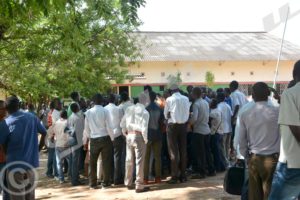
The signatories of the notice in front of the office of the Deputy Director in charge of security at the University of Burundi.
A summons for some students to appear fell on Monday 27 March 2017. It was signed by the Deputy Director in charge of security at the University of Burundi, OPC I Célestin Nibona Bonansize. “Having noted that there are signature irregularities, the use of false signatures: every student of the University of Burundi who signed on “the strike notice “is summoned to appear at the office of the Deputy Director in charge of security”, the invitation reads.
These signatories are asked to appear on different dates and by campus.
“They want to intimidate us but we will go to the very end,” said some representatives of the students. On Tuesday 28 March 2017, the appearance day of the first signatories of the strike notice, things took a different turn.
“As the meeting preparing this strike notice was held in the presence of all the students’ representatives, all of us decided to appear on the same day,” said one of the students’ representatives.
They were 178 signatories. Having arrived at the meeting place, he continues, two of us showed up first. There was an identification form with name, first name, telephone number and place of residence to be completed. As soon as they have left the venue, they launched an alert and the others boycotted this operation. She paused momentarily.
The hunt for signatories
“The ideas in the strike notice are clear. Instead of chasing us, the authorities should try to find a solution to our grievances. “Since the signing of this strike notice, students’ representatives say they are tracked down by the agents of the National Intelligence Service (SNR).
Élysée Dushime, a student in the Faculty of Economics, Department of Finance and Accounting in his third year at the National University, was arrested on Tuesday 28 March, when he was returning from an academic practice.
The next day, it was the turn of another students’ representative named Audace Nkunzimana of the Institute for Applied Pedagogy, Department of Biology-chemistry in third year. According to witnesses, his arrest took place at around 2 p.m., not very far from the main entrance of Mutanga Campus.
“Audace Nkunzimana, had just taken an exam at Rohero campus. Suddenly, a tinted vehicle arrived and some men on board took him with three of his companions. ”
He spent a night in one of the dungeons of the National Intelligence Agency (SNR) and the three others were released shortly.”Apparently, it is the hunt for the signatories of the strike notice sent to the President of the Republic”.
Fear in academic residences
Pierre Nkurikiye, Police Spokesman, confirms the arrest of those students. He says, they are incarcerated in the dungeons of the SNR. “They are accused of staging an uprising at the University of Burundi.”
Since the start of these arrests, the students live in fear. At Mutanga main campus, students gather in small groups to discuss the extent of their gesture alongside the arrests of their fellow students.
Outraged, they claim they do not understand the reasons for the arrests of their representatives: “Why are they arrested? How were they identified? Aren’t there moles on campus? ”
They fear being arrested at any time.”We do not dare go out of the campus anymore.” Some class representatives say they live in hiding.
Suspension of academic activities
UB students have decided to suspend classes since Thursday 30 March. They demand the liberation of their fellow students. They join those of High Teachers’ Training School (ENS) on strike since last March 24 against the presidential decree over scholarship reorganization.
Epipode Niyongabo, Chairman of the Association of Students of ENS (ACFD Imboneza), asked students living in the capital Bujumbura to go back to their places of origin in the country. Iwacu tried to contact the Rector of the national university but to no avail.
The letter to the President: A crime of lese-majesty?
The students’ representatives are convinced that they are persecuted because of the letter sent to the Head of State. They wonder whether or not their gesture is a crime.
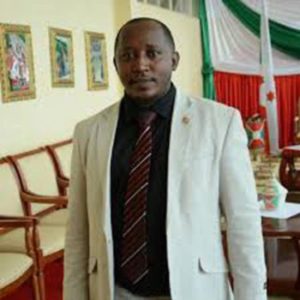
Jean Claude Karerwa: “The president received the letter.”
In this correspondence sent to the President of the Republic on Friday 24 March 2017, 178 students’ representatives announced the suspension of academic activities “in case they do not get favorable response to the letter between 24 March and 5 April, 2017”.
Their claims are only about one point: the abrogation of Decree No. 100/18 of 01/02/2017 reorganizing the system for managing scholarships and trainings.
For these students’ representatives, this decree has negative consequences for students such as “the discrimination of students from poor families to higher education, the division of students, the massive reduction of qualified intellectuals in Burundi and handicap to the life of a miserable student”.
Hue and cry on signatories
On the same day, the general representation of Burundi National University students disavowed the signatories of this strike notice. “We were surprised to see the representatives of some classes address an ultimatum to the President of the Republic while this is never done. The general representation informs the whole student community that this disorderly movement does not concern the representation, “wrote Syldie Barutwanayo, the president of the representation.
The following day, the administration of the National University warned the signatories and said that “the possible consequences will only fall on them.” The management of Burundi University recommends that all students use more diligence in their claims to the hierarchical authorities of the university and the highest authorities of the State.
These students’ representatives say this strike notice was addressed to the President of the Republic because he is the one who signed the decree. “We even petitioned him before its signing. After all, it is the Head of State that makes all decisions.” They added that the management of the university remained silent about their claims.
The Presidency of the Republic of Burundi has received the letter. According to its spokesman, Jean Claude Karerwa, the scholarship loan system is a result of the session on the general situation of education in Burundi held in December 2014.
He thinks the students have not read the decree well. “Students must read it again. We will continue to explain and if need be, we will seek the help of the experts. He wondered whether Burundi is richer than the Western and African countries that have adopted the system.
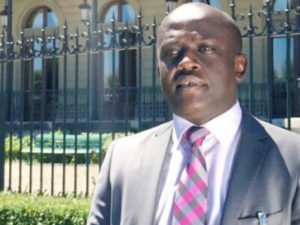
Armel Niyongere: “Launching a strike notice to claim their rights is not a crime at all, it’s a right.”
“Students are in their rights”
On his twitter account, Jean de Dieu Mutabazi, RADEBU party president said: “The form that the students have given to their strike notice against the decree on the scholarship loan gives it a political orientation. Burundi is still under the shock of the strikes and insurrectionary movements of 2014 and 2015. Students would rather calm down.”
This is not the opinion of Armel Niyongere, a human rights activist. “Launching a strike notice to claim their rights is not a crime at all, it’s a right and the people who signed this letter represent the students, to mean that what they did is legal.”
For him, ultimatum and strike notice must first be distinguished: “The students of the University gave a strike notice; they did not issue an ultimatum. Those who use the word ultimatum have other interests.”
Moreover, he said, the National Intelligence Service should not intervene in this case. “It is a pure and simple intimidation and, above all, that cannot solve this problem but which can even make it worse. The only solution is to talk. ”
The same letter from a former president of the Rumuri Students’ Association (ASSER) said: “The letter bearing this strike notice is written in a style which is both wise and polite. It shows that they have been patient enough and tried all the possible ways but to no avail. It is normal to address directly the person who took the measure. ”
Having written several similar letters, he continued, instead of intimidation and other maneuverings, the government should rather listen to them.
The rot has already set in
The relationship between the general representation of students and the class representatives has not been well established for a long time. On 3rd March, Syldie Barutwanayo, Chairman of the General Students’ Representation, asked the government to grant the students a consequent sum because of the high cost of life in case this Scholarship loan system would come into force. Class representatives saw, through these remarks, the support for the scholarship loan system.
On March 9, seven of the twelve members of the Executive Committee of the General Representation of Students resigned. They disapprove, among other things, the longevity of the representation whose members were appointed by the Rector following the failure of the establishment of a representation resulting from the April 2016 elections.
On 10 March, Syldie Barutwanayo appointed the replacements for those who resigned. On 13 March, the twenty-one general student representatives of all the institutes and faculties wrote a letter to the Rector, asking him not to recognize this appointment.
For them, the choice of representatives is only made through election. “Despite the few days remaining for him to lose the status of a student of the University of Burundi, he only dreams about defending his own interests. The recognition of his proposals would be a marginalization of the university authority. ”
Five students, three from the University of Burundi and two from the High Teachers’ Training School (ENS) have been summoned on 16 March by the Mukaza Commune High Court in the capital Bujumbura. While they were waiting for the Public Prosecutor’s Office for interrogation, they were shipped off and immediately taken to the National Intelligence Service (SNR). They were heard by agents before being imprisoned. In the afternoon, students from UB and ENS refused to attend classes in protest. The five students were released.
What about the scholarship loan system
This decree which was signed on 1 February 2017 is increasingly decried by students and parents.
It is stipulated in this decree that the scholarship is neither a salary nor remuneration. “The scholarship is a financial assistance granted by the Government for the training of executives according to their needs, within the limits of its means. It can be a loan or granted free of charge according to well-defined criteria “, the decree reads.
It also states that the loan is a financial assistance granted in the form of an interest-free loan for the training of executives and is repayable: “The scholarship loan is granted to secondary school graduates who succeeded in the state exam and meet the conditions for getting scholarships.”
Moreover, any high school graduate who is not eligible for the scholarship provided for in Articles 18 and 19 may apply for a scholarship loan for his/her university training in Burundi.
Students enrolled at the graduate and postgraduate level can benefit from the loan. Nevertheless, if the student has received the scholarship for his/her undergraduate university training, the granting of the scholarship loan for the master’s degree is conditional on the reimbursement of the entire first loan.
Similarly, if the student has received the scholarship loan for the second cycle, the granting of the scholarship loan for the third cycle (post graduate degree) is conditional upon the repayment of the entire first loan.
The conditions for granting and reimbursement, as well as the amount of the loan, shall be determined by joint order of the ministers responsible for higher education and finance.
During the study of the draft bill of this decree by the Council of Ministers on 26 October 2016, the government indicated that the interest of the system is to stimulate the students to advance and thus decrease the budgetary impact that results from the free granting of scholarship to students repeating a year. “The strike movements will also decline because” no courses, no scholarships. ”
Reactions
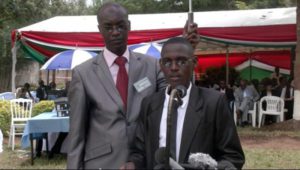 Syldie Barutwanayo: “The strike is counterproductive; the dialogue must rather be prioritized”
Syldie Barutwanayo: “The strike is counterproductive; the dialogue must rather be prioritized”
The chairman of the UB students’ general representation judges the decision by the students’ representatives to directly address the Head of State as unfounded.”Certainly, they have other aims behind or they are somehow manipulated.
Otherwise, this is not the right solution because there are other bodies empowered to resolve such issues, notably the Ministry of Education. ”
In any case, he says, it is the students who are going to suffer because I doubt that there are many of them able to afford bus fare to go home and come back.
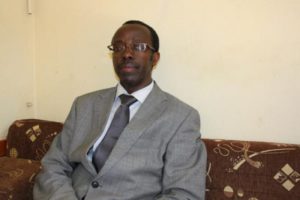 Libérat Ntibashirakandi: “The scholarship loan system, a disaster for the children of the poor”
Libérat Ntibashirakandi: “The scholarship loan system, a disaster for the children of the poor”
“The Burundian experience has already shown that improvisations, trial and error, and precipitation in educational system reforms have led to failures and adverse consequences for future generations.”
For this expert in education, this principle of reorganizing scholarships is not good given the economic situation in the country: “Since the income of the population is very low, how can we make a decision that will affect the future of the majority of young people in the country? Who will carry a debt contracted during their studies, probably throughout their lives? ”
According to him, this decree only reinforces the divide between the children of the privileged and the destitute.
“The children of the poor who will pass through the net and finish high school will once again be blocked by this scholarship loan system. They will prefer to drop out of higher education to avoid going into debt.”
For this scholar, it is inconceivable to introduce such a system insofar as the country is confronted with a very serious problem of youth unemployment, especially the graduates.
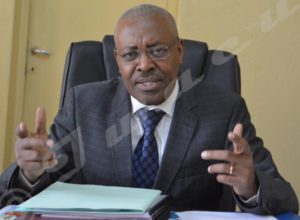 Jean De Dieu Mutabazi: “I support a claim that follows the rules”
Jean De Dieu Mutabazi: “I support a claim that follows the rules”
The president of RADEBU party said that at the social level, state resources were no longer available to provide free university education. Students are more numerous than before.
Mutabazi condemns the reaction of the students and supports a claim that follows the rules through the University management and Education Ministry. “We are not prepared to accept any form of violence and call on students to backtrack and take the path of dialogue.”
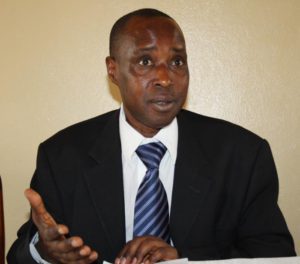 Léonce Ngendakumana: “A lack of vision”
Léonce Ngendakumana: “A lack of vision”
For the Vice-President of FRODEBU party, what happens denotes a lack of vision, planning, programming and action plan of the government in place.
Léonce Ngendakumana speaks of a bad decision that involves acts of intimidation of students by the agents of the National Intelligence Service and a mobilization against this measure.
“A Chinese author has rightly said that if you want to destroy a country, destroy its education. That is what is happening in our country right now. ”
Three questions to Dieudonné Bashirahishize, former president of RUMURI Students’ Association (ASSER)
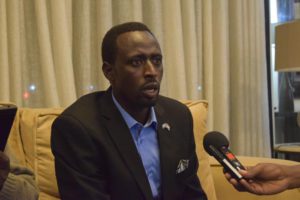 What do you think of this letter of the representatives of students at the University of Burundi to President Nkurunziza?
What do you think of this letter of the representatives of students at the University of Burundi to President Nkurunziza?
The letter is written in a style which is both wise and polite. It shows that they have been patient and had tried all possible ways but to no avail. It is normal for students to address directly the person who took the measure. For having written several similar letters, I believe that instead of using intimidation, the government should rather listen and abrogate this controversial decree by giving priority to consultation. To deprive the poor’s child of the right to go to university is to condemn him to eternal poverty. In short, I understand the purpose of the notice and call for a dialogue.
You’ve had to handle this kind of situation. How did you get by?
At the time when I was representing the students (2004-2005), the government tried to introduce this system, but in a subtle way trying to privatize the department of social affairs at the University. We had a strategy of using dialogue, lobbying and lobbying. We wrote a lot of correspondences and were in constant discussions with the rector, the ministry and the presidency of the republic to make it clear that the measure was far from being an adequate solution.
At the same time, we sent the students with these correspondences to convince all the parliamentarians elected in their provinces of origin.
The message was the same everywhere: “If you do not accede to our petitions, we will never accept the slow death you want to impose on us. We did all this in a solidarity which transcended the low divisive ideas in favor of the interest of the country.
What can students and authorities do now?
It is in difficult moments that one must remain standing in active non-violence. In their struggle, they must first explain to their parents, in a language they understand, the nobility of their struggle.
They must explain the urgency of this repeal of the controversial decree and unite all the living forces of the Nation against this unjust decision. I urge them to go beyond the political convictions to defend in unity and solidarity, these social rights acquired and defended by their elders for decades.
The current political class should not regard the University of Burundi as a burden. This institution has for many years remained as a seriously ill patient who is never prescribed the medicine for a disease with which he/she was diagnosed. Mauritius, South Korea or Singapore have developed because they have invested in quality education.
Burundi has no diamonds or enough gold and land is becoming scarce. There is an urgent need to invest in youth training. The government will have to remember that no country in the world has ever developed on the basis of mediocracy. The intimidation is not the right answer at all.

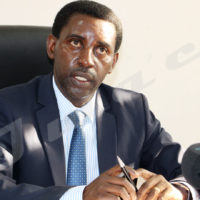
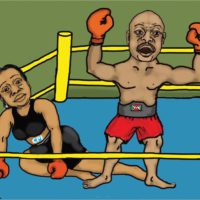
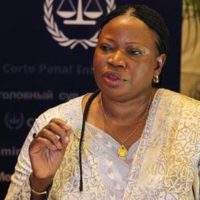

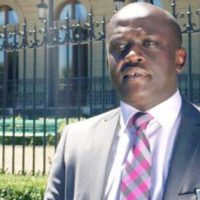













 IWACU Open Data
IWACU Open Data

